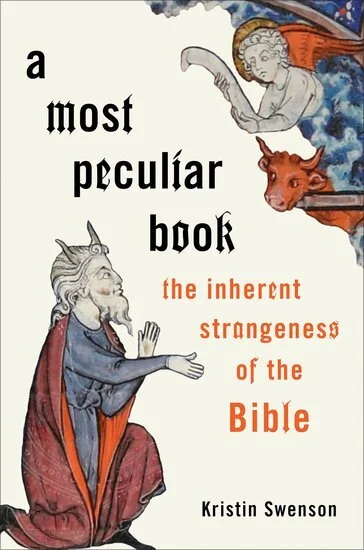A Most Peculiar Book by Kristin Swenson
/A Most Peculiar Book: The Inherent Strangeness of the Bible
By Kristin Swenson
Oxford University Press, 2021
It’s been ten years since Religious Studies professor Kristin Swenson came out with Bible Babel: Making Sense of the Most Talked About Book of All Time, and in 2021 she’s at it again (still? uninterrupted?) with A Most Peculiar Book: The Inherent Strangeness of the Bible, in which she gives a breezy, chatty overview of what the Bible is, what it isn’t, where it comes from, and, most importantly, what it really does and doesn’t say.
She clarifies that the Bible is actually a heterogenous library of very different kinds of texts. She expounds on how those texts were composed by different people, writing in different literary traditions, over the course of a thousand years. She explains that this very fact makes internal contradictions and incongruities inevitable and then examines some of those contradictions, starting right In the Beginning:
Now for some specifics of the diverse ways that the Bible represents God. They’re in full-fledged evidence from the start. Consider the theological chasm between Genesis chapter 1 and Genesis Chapter 2. In the first, God is absolutely Other and Out There. God never appears. From out of the ether, a disembodied God simply speaks the world elegantly into being, and what becomes is exactly as it is, say no more. By contrast, in the second chapter, God walks around, fashions objects (including a human being), plants a garden (or an orchard), and actually considers that things could be better - that the human being shouldn’t be alone, for example, which God addresses through a process of trial and error.
As Swenson cheerily and conversationally (Pharaoh issues an “executive order,” people “didn’t get the memo,” and so on) states the obvious - that nobody named Matthew, Mark, Luke, or John actually wrote the Gospels that bear those names, that Elohim in the Book of Genesis is clearly plural, an pantheon rather than a royal ‘we,’ that books of nearly identical provenance were editorially excluded from the ones later assembled into the Bible as we read it today - it’s still faintly possible to recover the frisson of remembering how much trouble authors in other times and other centuries brought upon themselves by writing exactly this kind of stuff. People have been ruined, tortured, and burned alive for enumerating the many, many ways that the Bible is an intensely flawed document, clearly the work of many ignorant and bigoted authors, each one mired firmly in his own time and place, and none of whom was “Divinely inspired” unless the Divine in question is a capricious, deceitful jerk.
Nevertheless, it hasn’t happened lately in the neighborhood, and all of the points Swenson makes will strike even entry-level secular participants in Bible study as obvious, pedestrian stuff. Yes, the Bible is often prized, referenced, and bequeathed by people who know nothing of its contents. Yes, the Bible is therefore a seedbed of hypocrisy. Yes, it contains countless contradictions, from the number of animals on Noah’s Ark to who killed Goliath to what exactly happened at the Resurrection. As powerful as Christianity has been in the world for the last two thousand years, even so readers have not exactly lacked for such commentaries, especially in post-Vatican II decades.
And Swenson’s sometimes lumbering obliviousness doesn’t help matters any. When discussing the fact that no Gospel authors include their name in their text, for instance, she expands on the point. “It may be surprising in our time of self-publishing, when nearly everyone who puts words to a page self-identifies as a published author, but a couple of thousand years ago people frequently wrote anonymously or otherwise attributed their writing to someone famous,” she writes. In 2019, well over two million posts were made to just a handful of social media platforms every minute, and well over 99% of those posts were either anonymous or attributed to somebody other than the author. Swenson doesn’t need to investigate such a horrifying picture, but it would be nice if she at least seemed aware of it.
Nevertheless, A Most Peculiar Book has a very specific patch of ground to cover, and it covers that patch well. This is a talky, hey-did-you-know look at the oddities of the most famous book in the world, and although Kristin Swenson’s fellow students of religion might consider it familiar to the point of redundant, most readers will be surprised and amused on virtually every page.
—Steve Donoghue is a founding editor of Open Letters Monthly. His book criticism has appeared in The Boston Globe, The Wall Street Journal, The Washington Post, and The National. He writes regularly for The Vineyard Gazette, the Daily Star and The Christian Science Monitor. His website is http://www.stevedonoghue.com.
